UNIT 7 ART LESSON 1 课件(共91张,内嵌视频)高中英语北师大版(2019)必修第三册
文档属性
| 名称 | UNIT 7 ART LESSON 1 课件(共91张,内嵌视频)高中英语北师大版(2019)必修第三册 |
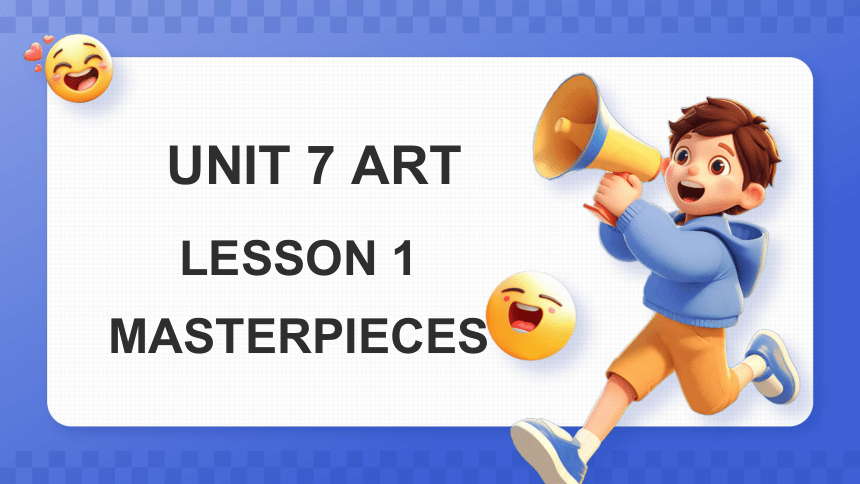
|
|
| 格式 | pptx | ||
| 文件大小 | 13.3MB | ||
| 资源类型 | 教案 | ||
| 版本资源 | 北师大版(2019) | ||
| 科目 | 英语 | ||
| 更新时间 | 2024-12-23 19:51:15 | ||
图片预览

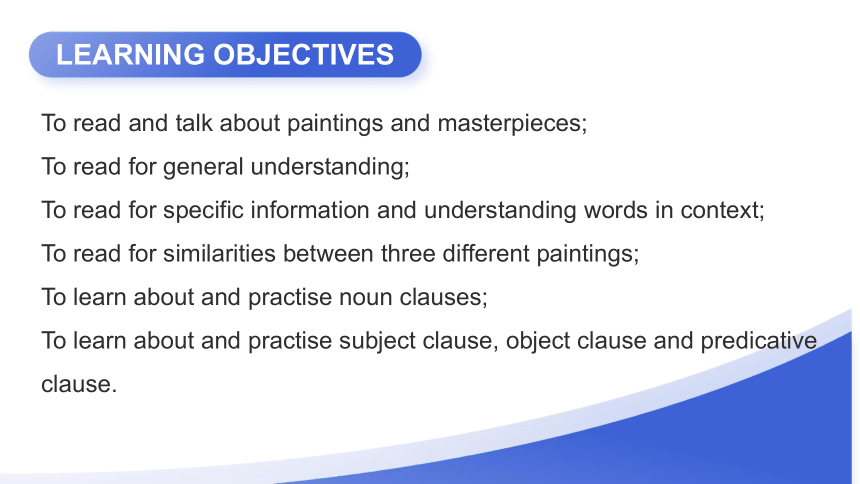
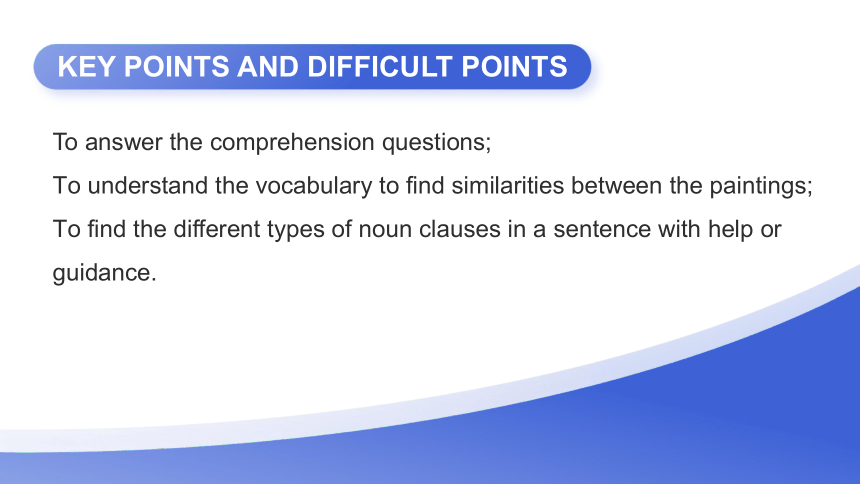
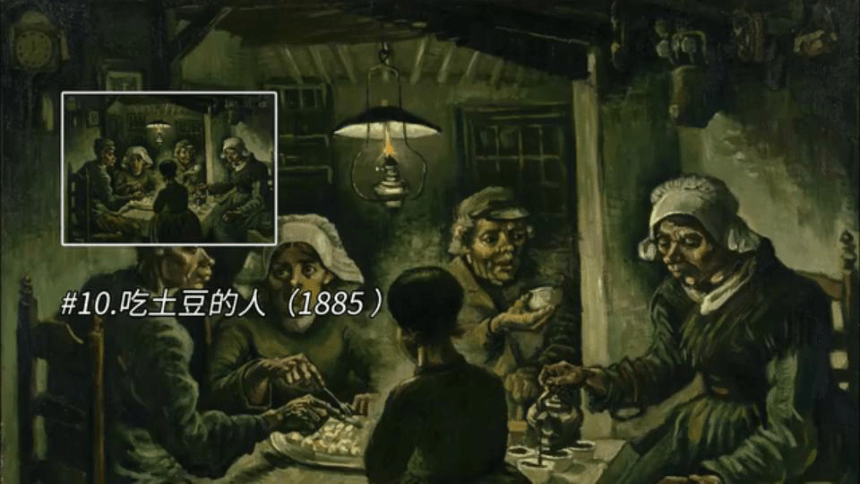
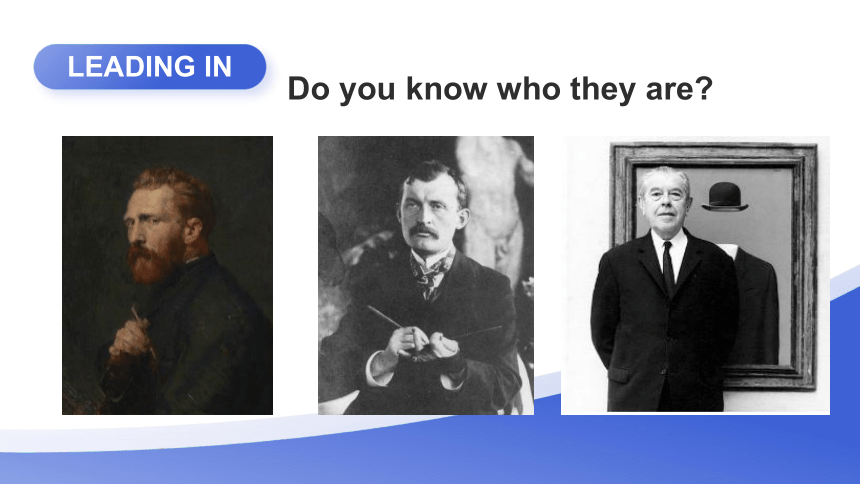
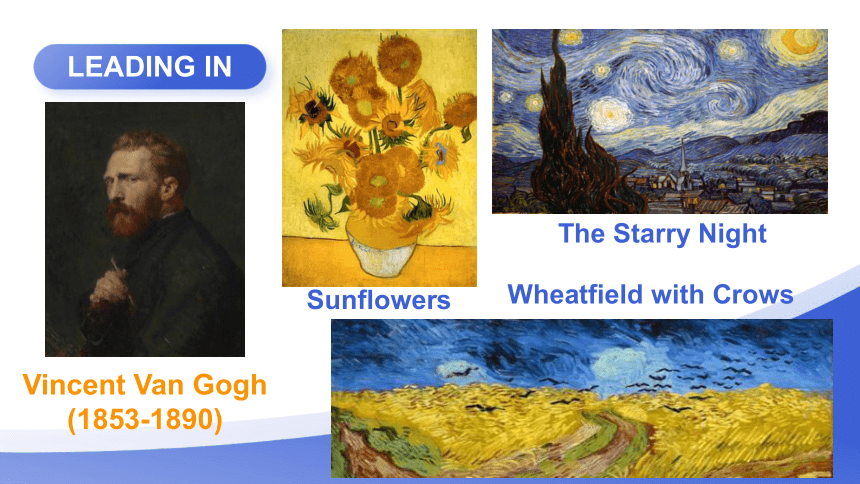
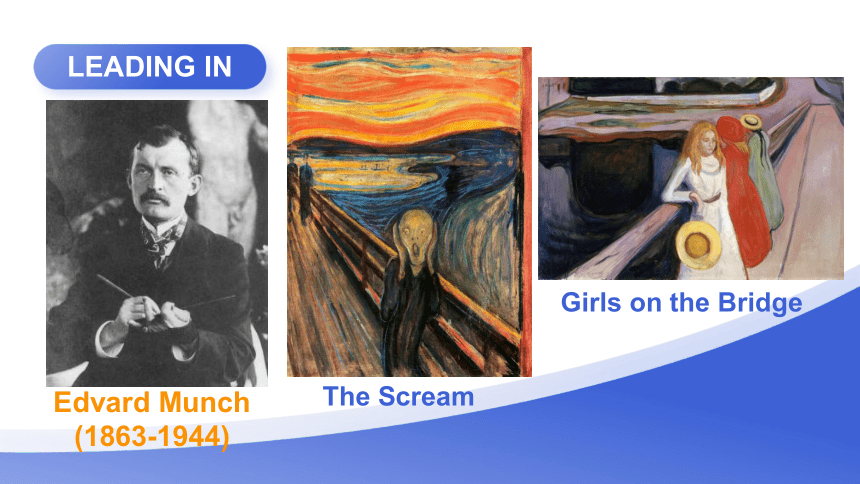

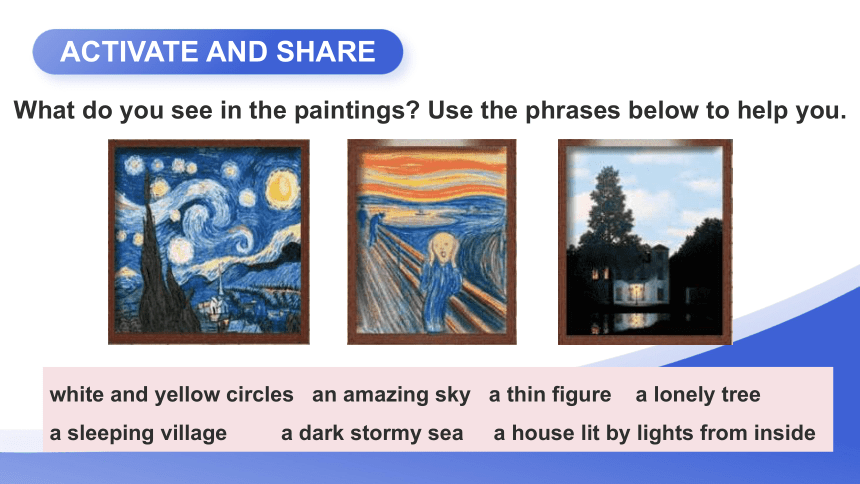
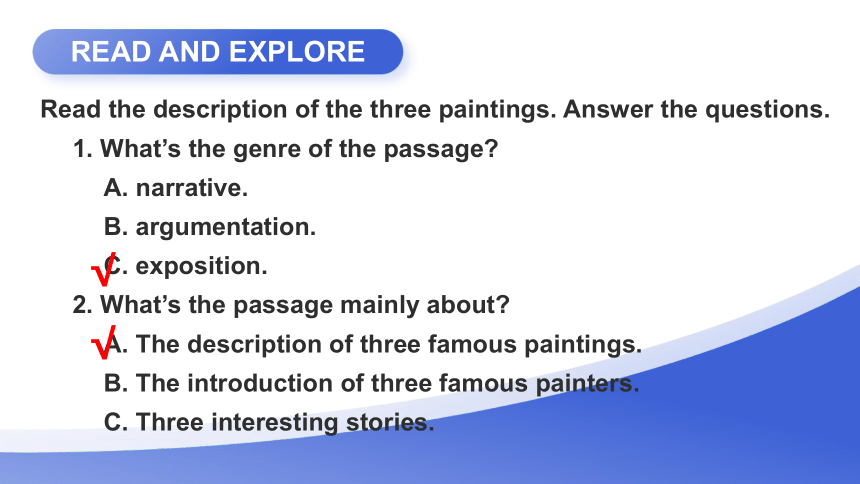
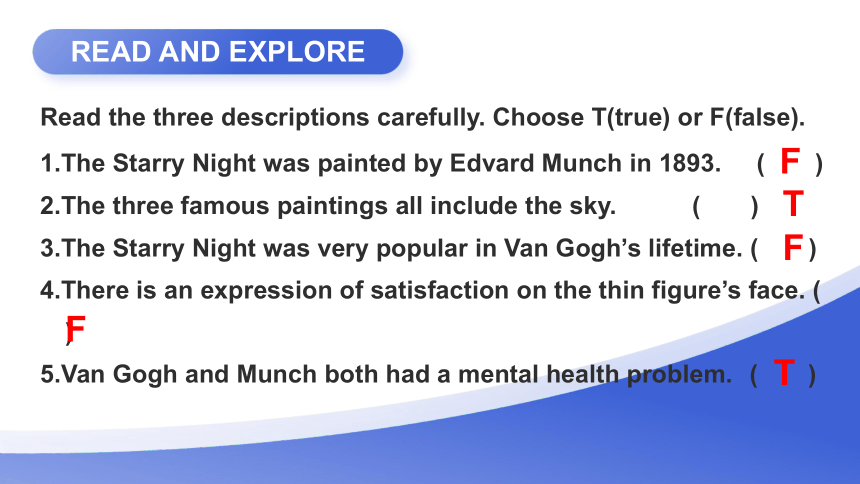
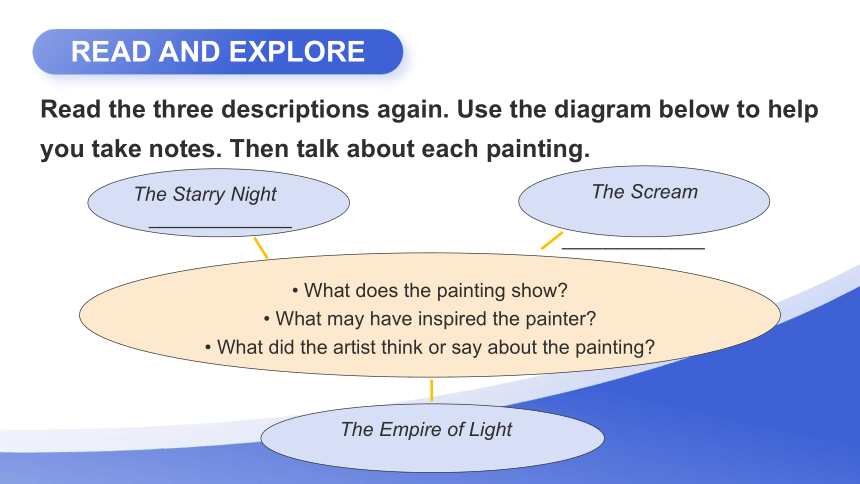
文档简介
(共91张PPT)
LESSON 1
MASTERPIECES
UNIT 7 ART
To read and talk about paintings and masterpieces;
To read for general understanding;
To read for specific information and understanding words in context;
To read for similarities between three different paintings;
To learn about and practise noun clauses;
To learn about and practise subject clause, object clause and predicative clause.
LEARNING OBJECTIVES
To answer the comprehension questions;
To understand the vocabulary to find similarities between the paintings;
To find the different types of noun clauses in a sentence with help or guidance.
KEY POINTS AND DIFFICULT POINTS
Do you know who they are
LEADING IN
Vincent Van Gogh
(1853-1890)
Sunflowers
The Starry Night
Wheatfield with Crows
LEADING IN
Edvard Munch (1863-1944)
The Scream
Girls on the Bridge
LEADING IN
LEADING IN
It’s not a Pipe
The Empire of Light
René Magritte
(1898-1967)
The Son of Man
ACTIVATE AND SHARE
What do you see in the paintings Use the phrases below to help you.
white and yellow circles an amazing sky a thin figure a lonely tree
a sleeping village a dark stormy sea a house lit by lights from inside
READ AND EXPLORE
Read the description of the three paintings. Answer the questions.
1. What’s the genre of the passage
A. narrative.
B. argumentation.
C. exposition.
2. What’s the passage mainly about
A. The description of three famous paintings.
B. The introduction of three famous painters.
C. Three interesting stories.
√
√
READ AND EXPLORE
Read the three descriptions carefully. Choose T(true) or F(false).
1.The Starry Night was painted by Edvard Munch in 1893. ( )
2.The three famous paintings all include the sky. ( )
3.The Starry Night was very popular in Van Gogh’s lifetime. ( )
4.There is an expression of satisfaction on the thin figure’s face. ( )
5.Van Gogh and Munch both had a mental health problem. ( )
F
T
F
F
T
READ AND EXPLORE
Read the three descriptions again. Use the diagram below to help you take notes. Then talk about each painting.
What does the painting show
What may have inspired the painter
What did the artist think or say about the painting
The Starry Night
_____________
The Scream
_____________
The Empire of Light
__________________
READ AND EXPLORE
The Starry Night
What does the painting show
What may have inspired the painter
What did the artist think or say about painting
The night sky with clouds, stars and a moon.
What he saw from the window.
He thought it was a failure.
READ AND EXPLORE
The Scream
What does the painting show
What may have inspired the painter
What did the artist think or say about painting
A thin figure with an expression of fear.
His experience of walking with friends.
Not mentioned in the text.
READ AND EXPLORE
The Empire of Light
What does the painting show
What may have inspired the painter
What did the artist think or say about painting
A beautiful house lit by lights from inside, surrounded by the darkness of the night.
His thoughts and ideas.
The change between day and night in the paintings was surprising.
READ AND EXPLORE
Pair Work Sort the expressions into the correct columns. Use them to practice introducing the paintings.
The Starry Night The Scream The Empire of Light
3, 6, 10
1, 2, 4, 9
5, 7, 8
READ AND EXPLORE
Look at the three paintings and read the first paragraph of each description. Do they have anything in common If so, underline the words and phrases in the descriptions that show their common features. Explain your opinions.
Example dark / darkness …
READ AND EXPLORE
· The words and phrases in the descriptions: the massive circles of white and yellow racing across the sky; a burning orange-red sky; a daytime sky full of brightness a dark, lonely tree; a dark, stormy sea; the darkness of night.
· Each painting is focused on the artist's interpretation of nature, especially the aspects of the sky. All three paintings paint the sky with bright colours and the darkness in each one manifests a typical feature.
READ AND EXPLORE
What's your opinion of the three paintings after reading the descriptions Do you like or dislike them more Give your reasons.
You can use the following sentence patterns:
1. I am crazy about... because...
2. I am keen on... because...
3. I adore... because...
READ AND EXPLORE
Other expressions
1. I like ..., because they are + adj.
2. The reason why I like ......is that they are + adj.
5. I’m a fan of.....,because.....
Reasons:
wonderful, amazing, colorful, energetic, exciting, elegant, special, traditional, interesting
READ AND EXPLORE
Group Work Suppose you are a volunteer at an art exhibition. Introduce one of the three paintings to the visitors.
READ AND EXPLORE
· Each group chooses one painting and selects one person to be the scribe and write down notes for the group.
· Each student in group describes the painting, and provides background to the painting, the artist, the inspiration behind the painting etc. The scribe can mind map this information.
· Each group writes at least ten complete sentences about the painting using these descriptions.
· Role play.
READ AND EXPLORE
Example
Good morning, ladies and gentlemen. I’m … I feel so honoured to give you an introduction of the famous painting … by …
…. shows…, …. was affected by/ was inspired by …,
… The artist(s) said …
In my opinion, … shows the emotion of …, because …. All of these give me the impression of/ that ….
FOCUS ON LANGUAGE: NOUN CLAUSES
Pair Work Read the sentences. Answer the questions.
1. Van Gogh painted what he saw from his window.
2. What makes it striking is that it shows a thin figure with an expression of fear.
3. What is strange is that above the house and the tree, we see a daytime sky full of brightness and soft white clouds.
4. Some feel that the paintings look dark and troubling.
FOCUS ON LANGUAGE: NOUN CLAUSES
Which sentence is an example of:
a. a subject clause, or a noun clause that acts as the subject of the sentence
b. an object clause, or a noun clause that acts as the object of the sentence
c. a predicative clause, or a noun clause that acts as the predicative of the sentence
2, 3
1, 4
2, 3
FOCUS ON LANGUAGE: NOUN CLAUSES
Combine the two expressions using a subject clause, an object clause or a predicative clause. Then write a complete sentence.
Example It is hard to believe
Van Gogh only sold one painting during his lifetime
It is hard to believe that Van Gogh only sold one painting during his lifetime.
FOCUS ON LANGUAGE: NOUN CLAUSES
1. Magritte painted in this way
The reason was that he wanted to challenge how people see the world
________________________________________________________________________________________________________________
2. Looking at the painting, we don't know
It is night or day
_____________________________________________________________________
The reason why Magritte painted in this way was that he wanted to challenge how people see the world.
Looking at the painting, we don't know whether it is night or day.
FOCUS ON LANGUAGE: NOUN CLAUSES
3. The fact remains
Munch's The Scream is one of the best-known paintings ever made
__________________________________________________________________________________________________________________
4. It is unclear
Van Gogh wanted to paint yellow spots or that was what he really saw
____________________________________________________________________________________________________
The fact remains that Munch's The Scream is one of the best–known paintings ever made.
It is unclear whether Van Gogh wanted to paint yellow spots or that was what he really saw.
FOCUS ON LANGUAGE: NOUN CLAUSES
Rewrite the underlined sentences in the following paragraph using noun clauses.
1. Xu Beihong was important in modern Chinese art. He developed the tradition of combining poetry with painting. 2. He wanted to promote Chinese art. He helped several exhibitions in Asia and Europe. In this painting named Racing Horse, we can see a horse running at high speed like a missile across the sky. On the left and right side of the painting, Xu cleverly drew in black ink to show the moving hair on the horse's mane and tail. He also used different shades of grey in a creative way to show the sweat along the horse's body. 3. It was painted so skillfully with dark and light colours. It is a favourite of many art lovers.
FOCUS ON LANGUAGE: NOUN CLAUSES
1. Xu Beihong was important in modern Chinese art. He developed the tradition of combining poetry with painting.
Xu Beihong was important in modern Chinese art in that he developed the tradition of combining poetry with painting.
2. He wanted to promote Chinese art. He held several exhibitions in Asia and Europe.
The reason he held several exhibitions in Asia and Europe was that he wanted to promote Chinese art.
3. It was painted so skillfully with dark and light colours. It is a favourite of many art lovers.
The reason it is a favourite of many art lovers was that it was painted so skillfully with dark and light colours.
EXPRESS YOURSELF
Group Work Read the quotes. Discuss the features of good paintings.
A man paints with his brain and not with his hands.
–Michelangelo, an Italian painter
Painting is silent poetry, and poetry is painting that speaks.
–Plutarch, an ancient Greek writer
Good painting is like good cooking; it can be tasted, but not explained.
–Maurice de Vlaminck, a French painter
GRAMMAR
名词性从句
在复合句中起名词作用的从句叫名词性从句,所谓名词性从句,就是把完整句子当作名词来使用,使之在另一个句子中充当某种成分。一般来说,名词在句中主要充当四种成分:主语、宾语、表语和同位语,从句在什么位置就是什么从句。常见的名词性从句有:主语从句、宾语从句、表语从句和同位语从句。
GRAMMAR
一、主语从句
1. 主语从句的定义
在主从复合句中,充当主语的从句,即为主语从句。
That she could come to help us made us very happy.
她能来帮助我们使我们很高兴。
Whether she will come or not is still a question.
她是否会来仍是个问题。
GRAMMAR
一、主语从句
2. 主语从句的连接词
(1)连词that和whether的用法
① that在从句中不充当句子的任何成分,只起连接作用,但不可省略。
That she is still alive is surprising.
她还活着,这令人吃惊。
That he was admitted into Beijing University made his teachers and parents happy.
他考上了北大,使得他的老师和父母都很高兴。
GRAMMAR
一、主语从句
② whether在从句中不充当任何句子成分,起连接作用,意为“是否”,不可省略。
Whether the plan will be carried out is still unknown.
这个计划是否会实施还不知道。
Whether we go by train or by boat makes no difference.
我们乘火车还是乘船没差别。
GRAMMAR
一、主语从句
(2)连接代词(who, whose, whom, what, which, whoever, whomever, whatever, whichever 等)。连接代词引导主语从句,在从句中可以作主语、宾语、表语或定语。
What he wants to tell us is not clear.
还不清楚他要跟我们说什么。
Whoever breaks the law should be punished.
无论是谁,只要违法就应该受到惩罚。
GRAMMAR
一、主语从句
(3)连接副词(when, where, how, why等)。连接副词引导主语从句并在从句中作状语。
When we will have a meeting is an important question.
我们何时举行会议是一个重要的问题。
Why John was late for the class has been unexplained.
约翰为什么上课迟到还没有说明。
GRAMMAR
一、主语从句
3. 主语从句中用it作形式主语的结构
如果主语从句太长,为避免句子结构头重脚轻,我们可用it作形式主语,而把主语从句放在主句谓语部分之后,尤其是当主句的谓语动词是连系动词时。常见的用形式主语it引导的主语从句结构有以下几种:
GRAMMAR
一、主语从句
(1)It+be+形容词+主语从句
常用于这种结构的形容词有:necessary, likely, right, wrong, important, certain, clear, obvious, strange, natural 等。
It is likely that he is the winner of this game.
很可能他是这场游戏的胜利者。
It's obvious that they badly need help.
很明显,他们急需帮助。
GRAMMAR
一、主语从句
注意:
“It +be + necessary/ important/ strange/ natural + that从句”结构中,从句常用“should+do”形式,其中should也可省略。
It is necessary that we (should) live a low-carbon life.
我们过低碳生活是很有必要的。
It is strange that he (should) know nothing about it.
真是奇怪,他对这件事情一点也不了解。
GRAMMAR
一、主语从句
(2)It+be+名词词组+主语从句
常用于这种句型的名词有a pity, a shame, a fact, an honour, a/ no surprise, a/ no wonder 等。
It's a pity (that) you missed the film.
你错过了那部电影真是太遗憾了。
It's no wonder that she speaks English so well.
难怪她英语说得那么好。
GRAMMAR
一、主语从句
(3)It+be+过去分词(said, reported, thought, expected, proved,…)+主语从句
It is said that the city is where the famous singer was born.
据说,那个城市就是那位著名的歌星出生的地方。
It is generally considered that boys are better at science than girls.
人们普遍认为男孩子比女孩子更擅长理科。
GRAMMAR
一、主语从句
注意:“It + be + suggested/ advised/ ordered/ requested/ insisted/ required + that 从句”的结构,that 从句应用“should+do”,should也可省略。
It's suggested that the old man (should) go to the countryside to have a rest.
建议这位老人到乡村去休息一下。
It is suggested that the meeting (should) be put off.
有人建议会议延期召开。
GRAMMAR
一、主语从句
(4)It+不及物动词(appears/ seems/ happens/ occurs to sb., doesn't matter, makes no difference,…)+主语从句
It seems to me that you disagree to the plan.
在我看来,你好像不赞成这个计划。
It happened to me that I had been away when he called.
他打电话时,我正好不在家。
GRAMMAR
一、主语从句
(5)It+及物动词+宾语+that从句
It surprised us that we were given a chance to study abroad.
让我们吃惊的是我们得到了去国外学习的机会。
It worried her a bit that her hair was turning grey.
她的头发在变白,这让她有点担心。
GRAMMAR
一、主语从句
4. 主语从句的注意事项
(1)从句的语序:在任何情况下,主语从句都用陈述语序。
Whichever of you gets here first will get the prize.
你们谁第一个到达这里谁就获奖。
Who will take his place is not important.
谁将代替他的位置并不重要。
GRAMMAR
一、主语从句
(2)主谓一致
① 从句作主语时,主句的谓语一般用单数形式;但what和who引导主语从句时,有时主句谓语的数应与主句中作表语的名词保持一致。
What we need is water.
我们需要的是水。
What we need are useful books.
我们需要的是有用的书。
GRAMMAR
一、主语从句
② 如果由and连接两个或两个以上的主语从句作主语时,谓语动词用复数;由两个或多个连接词引导一个主语从句时,谓语动词用单数。
When they will start and where they will go have not been decided yet.
他们将在什么时候动身以及要去哪里还没定下来。
When and where the meeting will be held has not been decided.
会议将在什么时候以及在哪里举行还没定下来。
GRAMMAR
一、主语从句
(3)whether引导的主语从句,如果用了形式主语it,引导词whether可以换成if。如果whether从句在句首或后面直接跟or not时,不能用if替换。
Whether they will sell the house is not yet decided.
(此时whether不可换成if)
=It is not decided yet whether/ if they will sell the house.
(此时whether与if可互换)
他们还没有决定是否卖掉这个房子。
GRAMMAR
二、宾语从句
1. 及物动词后的宾语从句
I will give whoever needs help a warm support.
凡是需要帮助的人我都会给予热情的支持。
Could you tell me where the booking office is
你能不能告诉我售票处在什么地方?
We all expect that they will win, for members of their team are stronger.
我们都预料他们会赢,因为他们的队员更强壮。
GRAMMAR
二、宾语从句
2. 介词后的宾语从句
We are talking about what we'll do next.
我们正在讨论下一步我们要做什么。
She always thinks of how she can work well.
她总是在想怎样把工作做好。
I know nothing about my new neighbor except that he used to work with a company.
对于我的新邻居我只知道他曾在一家公司上班,其他一无所知。
GRAMMAR
二、宾语从句
3. 形容词后的宾语从句
sure, certain, glad, pleased, happy, afraid, surprised, satisfied, sorry 等表示情感的形容词后可接宾语从句。
We're pleased that we have once again overcome the difficulty.
真是高兴,我们再次战胜了困难。
I'm not sure whether they'll agree to such a plan.
我不确定他们是否同意这样一个计划。
GRAMMAR
二、宾语从句
4. that引导的宾语从句
that引导宾语从句时无词义,也不充当任何成分,且在口语或非正式文体中常可省略。
She said that she admired Meng Peijie very much.
她说她非常佩服孟佩杰。
She decided that she was going to be a nurse.
她决定将来成为一名护士。
GRAMMAR
二、宾语从句
(1)that作宾语从句的引导词时可省略,但当一个句子有两个或多个并列的宾语从句时,引导第二个和以后几个从句的that不可省略。
He said (that) Mrs. Wang was kind and that we could turn to her for help.
他说王太太很善良,我们可以向她求助。
They told us (that) there would be a meeting that afternoon and that we all should attend the meeting.
他们告诉我们那天下午会有一个会议,并且我们都应该参加这个会议。
GRAMMAR
二、宾语从句
(2)在可以接复合宾语的动词之后,如think, make, consider等,可以用it作形式宾语,而把真正的宾语从句后置,在这种情况下that不能省略。
I made it clear that I was determined to carry out the plan.
(that不能省略)我已表明决心执行这个计划。
I think it a pity that you could not come.
你不能来,我深深惋惜。
GRAMMAR
二、宾语从句
(3)主句谓语和宾语从句之间有插入语时,宾语从句前的that不能省略。
Just then I noticed, for the first time, thathe prepared to talk to us.
就在那时,我第一次注意到他准备和我们谈话。
He announced, believe it or not, that he would never forgive her.
信不信由你,他宣布他绝不会原谅她。
GRAMMAR
二、宾语从句
(4)在 demand, order, suggest, decide, insist, desire, request, command, doubt等表示要求、命令、建议、决定等意义的动词后,宾语从句常用“(should)+动词原形”。
I insist that she (should) do her work alone.
我坚持要她自己工作。
The policeman demanded that the gate should be shut.
警察命令把大门关上。
GRAMMAR
二、宾语从句
5. whether/if引导的宾语从句
从属连词whether/if作“是否”讲时,常用在ask, care, find out, know, wonder等动词(短语)后引出带有疑问意义的宾语从句,从句中仍保持陈述语序,whether或if不充当句子成分。
I don't know if/ whether he will go to the cinema this evening.
我不知道今晚他是否会去看电影。
Do you know whether/ if any decision has been arrived at
你知道是否已经做出决定了吗?
GRAMMAR
二、宾语从句
只能用whether引导宾语从句的情况:
(1)作介词宾语时,只能用whether引导宾语从句。
I haven't settled the question of whether I'll go back home.
我还没有决定是否回家。
It depends on whether you can do the work well.
那取决于你是否能将工作做好。
GRAMMAR
二、宾语从句
(2)whether与or或or not连用时,不可用if替换。
She doesn't know whether she should get married now or wait.
她不知道是现在就结婚还是等等再说。
I wonder whether or not we should make it clear that we've lost this game.
我在想我们是否应该说清楚我们已经输了这场比赛。
GRAMMAR
二、宾语从句
(3)动词doubt用于肯定句,其宾语从句用whether引导。
I doubt the feasibility of the plan.
我怀疑这个计划的可行性。
I doubt very much whether he is coming.
我非常怀疑他是否要来。
We still doubt whether what he said is true.
我们仍旧怀疑他说的话是否是真的。
GRAMMAR
二、宾语从句
6. 连接代词和连接副词引导的宾语从句
连接代词 who, whom, whose, what, which, whatever, whoever, whomever, whichever和连接副词when, where, how, why这些连接词都有词义,除引导从句外,还在从句中充当一定的成分,可作主语、宾语、表语、定语、状语等。这种宾语从句有疑问意义,但不是疑问句,不能用疑问语序,而要用陈述语序。
GRAMMAR
二、宾语从句
I don't know what the little girl likes.
我不知道这个小女孩喜欢什么。
She wants to know why that little boy is crying.
她想知道那个小男孩为什么哭。
Could you tell me which job I should take, please
请你告诉我我应该选择哪种工作,好吗?
GRAMMAR
二、宾语从句
7. 使用宾语从句应注意的几个问题
(1)宾语从句的语序。宾语从句的语序应为陈述句的语序,即“主语+谓语+宾语+其他”。
Can you tell me how I can get in touch with the famous doctor
你能告诉我怎样与那位著名的医生取得联系吗?
GRAMMAR
二、宾语从句
(2)宾语从句的时态。如果主句的时态是一般现在时,宾语从句可以用相应的任何时态;如果主句的时态是一般过去时,宾语从句只能用相应的过去时态;如果宾语从句所陈述的是客观真理,其时态常用一般现在时。
He said that he had been to New York.
(从句是过去完成时)他说他曾去过纽约。
Our teacher told us that light travels faster than sound.
(从句陈述的是客观事实)老师说光比声音传播得快。
GRAMMAR
二、宾语从句
(3)当主句谓语动词是 think, believe, suppose, expect 等词,而宾语从句的意思是否定时,常把否定转移至主句表示。
I don't think the young man will accept the advice.
我认为这个年轻人不会接受这个建议。
I don't think he can finish the work on time.
我认为他无法按时完成工作。
GRAMMAR
二、宾语从句
(4)有些动词(短语),如 enjoy, love, like, hate, appreciate, take, hide, see to, insist on, depend on, rely on等带宾语从句时,习惯上在从句前加形式宾语it。
I hate it when people ask me for money.
我不喜欢别人向我借钱。
I will appreciate it if you can give me a hand.
如果你能帮我一把,我会很感激。
GRAMMAR
三、表语从句
1. that引导的表语从句
连接词that在从句中只起到连接作用,不作任何成分。
The trouble is that I have lost his address.
问题是我把他的地址弄丢了。
What I particularly dislike about this lesson is that it is really boring.
我特别不喜欢这节课是因为它的确令人乏味。
GRAMMAR
三、表语从句
2. whether引导的表语从句
连接词whether起连接作用,意为“是否;究竟;到底”,在句中不作任何成分。
What he wants to know is whether we can finish our work by tomorrow morning.
他想要知道的是我们到明天早上能否完成工作。
The question is whether you can do the work well.
问题是你能否做好这项工作。
GRAMMAR
三、表语从句
3. 从属连词 as, as if/ though 引导的表语从句
It sounds as if someone is knocking at the door.
听起来好像有人在敲门。
The pencil seems as though it were broken when it is partly put in the water.
当把铅笔的一部分放入水中时,它看上去好像断了。
GRAMMAR
三、表语从句
4. because, why引导的表语从句
That's because he didn't understand me.
(That's because…强调原因)
那是因为他没有理解我。
That's why he got angry with me.
(That's why...强调结果)
那正是他对我生气的原因。
GRAMMAR
三、表语从句
注意:reason作主语时,后面的表语从句表示原因时,要用that引导,不宜用because。
The reason why I was sad was that he didn't understand me.
我难过的原因是他没有理解我。
The reason why he asked for two days' leave is that he had to take care of his sick son.
他请了两天假的原因是他要照顾他生病的儿子。
GRAMMAR
三、表语从句
5. wh-疑问词引导的表语从句
连接代词 who, whom, whose, what, which, whoever, whatever, whichever和连接副词where, when, how, why引导的表语从句。
The problem is who we can get to replace her.
问题是我们能找到谁去替代她。
Their difficulty is where they can raise enough money.
他们的困难是他们到哪里能筹到足够的钱。
GRAMMAR
三、表语从句
6. 主语是表示建议、命令、要求、计划(suggestion, advice, order, request, proposal)等的名词,那么表语从句应该用虚拟语气,即should后接动词原形,should可以省略。
My suggestion is that we (should) leave the village right now.
我的建议是我们应该立刻离开这个村子。
His request is that they (should) stay here for the night.
他请求他们在这里待一晚。
GRAMMAR
四、同位语从句
在复合句中,跟在一个名词后对其作进一步解释说明的从句叫同位语从句。
能跟同位语从句的名词有fact, news, idea, truth, doubt, belief, hope, problem, information, wish, promise, answer, possibility, question, evidence, report, explanation, suggestion, conclusion等抽象名词。
GRAMMAR
四、同位语从句
I heard the news that our team had won.
我听到了我们队获胜的消息。
I don't like the idea that money is everything.
我不喜欢认为金钱就是一切的观点。
There's a feeling in me that we'll never know what a UFO is.
我有一种感觉,我们永远都无法知道不明飞行物是什么。
GRAMMAR
四、同位语从句
1. 同位语从句的连接词
引导同位语从句的词有连词 that, whether,疑问代词who, which, what和疑问副词where, when, why, how等。
(1)由连词that, whether引导的同位语从句。
that, whether引导从句,但在从句中不作成分,不能省略。that无意义;whether有“是否”之意。
GRAMMAR
四、同位语从句
They heard the news on the radio yesterday that a typhoon was coming.
昨天他们从收音机里听到台风要来的消息。
The problem whether he will be sentenced for drunk driving isn't clear.
他是否会因酒后驾驶而被判刑这一问题还不清楚。
GRAMMAR
四、同位语从句
(2)由疑问代词who, which, what引导的同位语从句。疑问代词在从句中作主语、宾语或定语。
The question who should go abroad required consideration.
(who在从句中作主语)谁会出国这个问题还需要考虑。
I have no idea which one I should choose.
(which 在从句中作定语)我不知道该选哪一个。
He has no idea what he should do next.
(what在从句中作宾语)他不知道下一步要做什么。
GRAMMAR
四、同位语从句
(3)由疑问副词when, where, why, how引导的同位语从句。疑问副词在从句中作时间状语、地点状语、原因状语和方式状语。
I have no idea when he will be back from Shanghai.
我不知道他何时从上海回来。
I still have no idea why they left the party without a word last night.
我仍然不知道昨晚他们为什么没说一句话就离开了宴会。
GRAMMAR
四、同位语从句
It remains a mystery how it happened.
(how 在从句中作方式状语)
那事是怎么发生的仍然是个谜。
The question where we will go to spend our holiday has not been discussed.
(where在从句中作地点状语)
我们要去哪里度假这一问题还没被讨论。
GRAMMAR
四、同位语从句
2. 使用同位语从句应注意的几个问题
(1)当主句的谓语较短,而同位语从句较长时,为避免头重脚轻,同位语从句常后置,构成分隔式同位语从句。
Word came that the famous scientist would come to see us.
有消息传来,那位著名的科学家要来看望我们。
The thought came to him that Mary had probably fallen ill.
他想到玛丽可能生病了。
GRAMMAR
四、同位语从句
名词doubt后可跟同位语从句,若用于肯定句中时用whether引导;若用于否定句中时则用that引导。
There is no doubt that prices will go up.
毫无疑问物价会上涨。
There is some doubt whether they will come to help us.
他们是否能来帮助我们还不确定。
GRAMMAR
四、同位语从句
(2)名词 suggestion, order, demand, command, request, desire, proposal等后的同位语从句要使用虚拟语气,即从句谓语用"should+do",should可省略。
The general gave the order that the soldiers (should) cross the river at once.
将军下达了战士们立即过河的命令。
VOCABULARY
1. affect
be affected by heat/ cold 中暑/ 着凉
be affected by/ with a high fever 发高烧
be greatly/ deeply affected 很/ 深受感动
have an effect on… 对……产生影响
take effect 生效;奏效 come into effect 生效;实行
be of no effect 无效的;无用的
练习:Never hate your enemies. It will ____________ your judgement.
affect
VOCABULARY
2. striking
strike 打,击;突袭;敲响;报时;给……以(深刻)印象
be struck by/ with… 被……击中;被……打动,迷恋……
It strikes sb. that (=It occurs to sb. that)... 某人突然想到……
strike…into one's heart ……使某人刻骨铭心
be/ go on strike 罢工
练习:The most ____________ feature of the place is its natural scenery.
striking
VOCABULARY
3. let out
let sth. out 泄露;放宽;放大(衣服尺寸等);让……跑掉
let sb. out 放某人出去,释放某人
let sb. down 让某人失望
let sb./ sth. in 让某人/ 某物进来
let alone 更不用说
let go of 放开,释放
练习:Jane ___________ unconsciously where she had hidden her father's birthday present.
let out
1. It suddenly occurred to him _________ he had left his key in the office.
2. It is difficult for us to imagine _________ life was like for slaves in the ancient world.
3. The best moment for the football star was _________ he scored the winning goal.
4. Life is _________ happens to you while you are busy making other plans.
PRACTICE
that
what
when
what
5. You can never tell _________ close you may be to victory.
6. Modern science have given clear evidence _________ smoking can lead to many diseases.
7. From space, the earth looks blue. This is ______________ about seventy percent of its surface is covered by water.
8. When the news came _________ the war broke out, he decided to serve in the army.
PRACTICE
how
that
because
that
SUMMARY
Talk about paintings and masterpieces;
Read for general understanding and specific information;
Understand and learn words and expressions in context;
Find the different types of clauses in a sentence;
Learn about and practice noun clauses: subject clause, object clause, predicative clause and appositive clause.
Thank you
LESSON 1
MASTERPIECES
UNIT 7 ART
To read and talk about paintings and masterpieces;
To read for general understanding;
To read for specific information and understanding words in context;
To read for similarities between three different paintings;
To learn about and practise noun clauses;
To learn about and practise subject clause, object clause and predicative clause.
LEARNING OBJECTIVES
To answer the comprehension questions;
To understand the vocabulary to find similarities between the paintings;
To find the different types of noun clauses in a sentence with help or guidance.
KEY POINTS AND DIFFICULT POINTS
Do you know who they are
LEADING IN
Vincent Van Gogh
(1853-1890)
Sunflowers
The Starry Night
Wheatfield with Crows
LEADING IN
Edvard Munch (1863-1944)
The Scream
Girls on the Bridge
LEADING IN
LEADING IN
It’s not a Pipe
The Empire of Light
René Magritte
(1898-1967)
The Son of Man
ACTIVATE AND SHARE
What do you see in the paintings Use the phrases below to help you.
white and yellow circles an amazing sky a thin figure a lonely tree
a sleeping village a dark stormy sea a house lit by lights from inside
READ AND EXPLORE
Read the description of the three paintings. Answer the questions.
1. What’s the genre of the passage
A. narrative.
B. argumentation.
C. exposition.
2. What’s the passage mainly about
A. The description of three famous paintings.
B. The introduction of three famous painters.
C. Three interesting stories.
√
√
READ AND EXPLORE
Read the three descriptions carefully. Choose T(true) or F(false).
1.The Starry Night was painted by Edvard Munch in 1893. ( )
2.The three famous paintings all include the sky. ( )
3.The Starry Night was very popular in Van Gogh’s lifetime. ( )
4.There is an expression of satisfaction on the thin figure’s face. ( )
5.Van Gogh and Munch both had a mental health problem. ( )
F
T
F
F
T
READ AND EXPLORE
Read the three descriptions again. Use the diagram below to help you take notes. Then talk about each painting.
What does the painting show
What may have inspired the painter
What did the artist think or say about the painting
The Starry Night
_____________
The Scream
_____________
The Empire of Light
__________________
READ AND EXPLORE
The Starry Night
What does the painting show
What may have inspired the painter
What did the artist think or say about painting
The night sky with clouds, stars and a moon.
What he saw from the window.
He thought it was a failure.
READ AND EXPLORE
The Scream
What does the painting show
What may have inspired the painter
What did the artist think or say about painting
A thin figure with an expression of fear.
His experience of walking with friends.
Not mentioned in the text.
READ AND EXPLORE
The Empire of Light
What does the painting show
What may have inspired the painter
What did the artist think or say about painting
A beautiful house lit by lights from inside, surrounded by the darkness of the night.
His thoughts and ideas.
The change between day and night in the paintings was surprising.
READ AND EXPLORE
Pair Work Sort the expressions into the correct columns. Use them to practice introducing the paintings.
The Starry Night The Scream The Empire of Light
3, 6, 10
1, 2, 4, 9
5, 7, 8
READ AND EXPLORE
Look at the three paintings and read the first paragraph of each description. Do they have anything in common If so, underline the words and phrases in the descriptions that show their common features. Explain your opinions.
Example dark / darkness …
READ AND EXPLORE
· The words and phrases in the descriptions: the massive circles of white and yellow racing across the sky; a burning orange-red sky; a daytime sky full of brightness a dark, lonely tree; a dark, stormy sea; the darkness of night.
· Each painting is focused on the artist's interpretation of nature, especially the aspects of the sky. All three paintings paint the sky with bright colours and the darkness in each one manifests a typical feature.
READ AND EXPLORE
What's your opinion of the three paintings after reading the descriptions Do you like or dislike them more Give your reasons.
You can use the following sentence patterns:
1. I am crazy about... because...
2. I am keen on... because...
3. I adore... because...
READ AND EXPLORE
Other expressions
1. I like ..., because they are + adj.
2. The reason why I like ......is that they are + adj.
5. I’m a fan of.....,because.....
Reasons:
wonderful, amazing, colorful, energetic, exciting, elegant, special, traditional, interesting
READ AND EXPLORE
Group Work Suppose you are a volunteer at an art exhibition. Introduce one of the three paintings to the visitors.
READ AND EXPLORE
· Each group chooses one painting and selects one person to be the scribe and write down notes for the group.
· Each student in group describes the painting, and provides background to the painting, the artist, the inspiration behind the painting etc. The scribe can mind map this information.
· Each group writes at least ten complete sentences about the painting using these descriptions.
· Role play.
READ AND EXPLORE
Example
Good morning, ladies and gentlemen. I’m … I feel so honoured to give you an introduction of the famous painting … by …
…. shows…, …. was affected by/ was inspired by …,
… The artist(s) said …
In my opinion, … shows the emotion of …, because …. All of these give me the impression of/ that ….
FOCUS ON LANGUAGE: NOUN CLAUSES
Pair Work Read the sentences. Answer the questions.
1. Van Gogh painted what he saw from his window.
2. What makes it striking is that it shows a thin figure with an expression of fear.
3. What is strange is that above the house and the tree, we see a daytime sky full of brightness and soft white clouds.
4. Some feel that the paintings look dark and troubling.
FOCUS ON LANGUAGE: NOUN CLAUSES
Which sentence is an example of:
a. a subject clause, or a noun clause that acts as the subject of the sentence
b. an object clause, or a noun clause that acts as the object of the sentence
c. a predicative clause, or a noun clause that acts as the predicative of the sentence
2, 3
1, 4
2, 3
FOCUS ON LANGUAGE: NOUN CLAUSES
Combine the two expressions using a subject clause, an object clause or a predicative clause. Then write a complete sentence.
Example It is hard to believe
Van Gogh only sold one painting during his lifetime
It is hard to believe that Van Gogh only sold one painting during his lifetime.
FOCUS ON LANGUAGE: NOUN CLAUSES
1. Magritte painted in this way
The reason was that he wanted to challenge how people see the world
________________________________________________________________________________________________________________
2. Looking at the painting, we don't know
It is night or day
_____________________________________________________________________
The reason why Magritte painted in this way was that he wanted to challenge how people see the world.
Looking at the painting, we don't know whether it is night or day.
FOCUS ON LANGUAGE: NOUN CLAUSES
3. The fact remains
Munch's The Scream is one of the best-known paintings ever made
__________________________________________________________________________________________________________________
4. It is unclear
Van Gogh wanted to paint yellow spots or that was what he really saw
____________________________________________________________________________________________________
The fact remains that Munch's The Scream is one of the best–known paintings ever made.
It is unclear whether Van Gogh wanted to paint yellow spots or that was what he really saw.
FOCUS ON LANGUAGE: NOUN CLAUSES
Rewrite the underlined sentences in the following paragraph using noun clauses.
1. Xu Beihong was important in modern Chinese art. He developed the tradition of combining poetry with painting. 2. He wanted to promote Chinese art. He helped several exhibitions in Asia and Europe. In this painting named Racing Horse, we can see a horse running at high speed like a missile across the sky. On the left and right side of the painting, Xu cleverly drew in black ink to show the moving hair on the horse's mane and tail. He also used different shades of grey in a creative way to show the sweat along the horse's body. 3. It was painted so skillfully with dark and light colours. It is a favourite of many art lovers.
FOCUS ON LANGUAGE: NOUN CLAUSES
1. Xu Beihong was important in modern Chinese art. He developed the tradition of combining poetry with painting.
Xu Beihong was important in modern Chinese art in that he developed the tradition of combining poetry with painting.
2. He wanted to promote Chinese art. He held several exhibitions in Asia and Europe.
The reason he held several exhibitions in Asia and Europe was that he wanted to promote Chinese art.
3. It was painted so skillfully with dark and light colours. It is a favourite of many art lovers.
The reason it is a favourite of many art lovers was that it was painted so skillfully with dark and light colours.
EXPRESS YOURSELF
Group Work Read the quotes. Discuss the features of good paintings.
A man paints with his brain and not with his hands.
–Michelangelo, an Italian painter
Painting is silent poetry, and poetry is painting that speaks.
–Plutarch, an ancient Greek writer
Good painting is like good cooking; it can be tasted, but not explained.
–Maurice de Vlaminck, a French painter
GRAMMAR
名词性从句
在复合句中起名词作用的从句叫名词性从句,所谓名词性从句,就是把完整句子当作名词来使用,使之在另一个句子中充当某种成分。一般来说,名词在句中主要充当四种成分:主语、宾语、表语和同位语,从句在什么位置就是什么从句。常见的名词性从句有:主语从句、宾语从句、表语从句和同位语从句。
GRAMMAR
一、主语从句
1. 主语从句的定义
在主从复合句中,充当主语的从句,即为主语从句。
That she could come to help us made us very happy.
她能来帮助我们使我们很高兴。
Whether she will come or not is still a question.
她是否会来仍是个问题。
GRAMMAR
一、主语从句
2. 主语从句的连接词
(1)连词that和whether的用法
① that在从句中不充当句子的任何成分,只起连接作用,但不可省略。
That she is still alive is surprising.
她还活着,这令人吃惊。
That he was admitted into Beijing University made his teachers and parents happy.
他考上了北大,使得他的老师和父母都很高兴。
GRAMMAR
一、主语从句
② whether在从句中不充当任何句子成分,起连接作用,意为“是否”,不可省略。
Whether the plan will be carried out is still unknown.
这个计划是否会实施还不知道。
Whether we go by train or by boat makes no difference.
我们乘火车还是乘船没差别。
GRAMMAR
一、主语从句
(2)连接代词(who, whose, whom, what, which, whoever, whomever, whatever, whichever 等)。连接代词引导主语从句,在从句中可以作主语、宾语、表语或定语。
What he wants to tell us is not clear.
还不清楚他要跟我们说什么。
Whoever breaks the law should be punished.
无论是谁,只要违法就应该受到惩罚。
GRAMMAR
一、主语从句
(3)连接副词(when, where, how, why等)。连接副词引导主语从句并在从句中作状语。
When we will have a meeting is an important question.
我们何时举行会议是一个重要的问题。
Why John was late for the class has been unexplained.
约翰为什么上课迟到还没有说明。
GRAMMAR
一、主语从句
3. 主语从句中用it作形式主语的结构
如果主语从句太长,为避免句子结构头重脚轻,我们可用it作形式主语,而把主语从句放在主句谓语部分之后,尤其是当主句的谓语动词是连系动词时。常见的用形式主语it引导的主语从句结构有以下几种:
GRAMMAR
一、主语从句
(1)It+be+形容词+主语从句
常用于这种结构的形容词有:necessary, likely, right, wrong, important, certain, clear, obvious, strange, natural 等。
It is likely that he is the winner of this game.
很可能他是这场游戏的胜利者。
It's obvious that they badly need help.
很明显,他们急需帮助。
GRAMMAR
一、主语从句
注意:
“It +be + necessary/ important/ strange/ natural + that从句”结构中,从句常用“should+do”形式,其中should也可省略。
It is necessary that we (should) live a low-carbon life.
我们过低碳生活是很有必要的。
It is strange that he (should) know nothing about it.
真是奇怪,他对这件事情一点也不了解。
GRAMMAR
一、主语从句
(2)It+be+名词词组+主语从句
常用于这种句型的名词有a pity, a shame, a fact, an honour, a/ no surprise, a/ no wonder 等。
It's a pity (that) you missed the film.
你错过了那部电影真是太遗憾了。
It's no wonder that she speaks English so well.
难怪她英语说得那么好。
GRAMMAR
一、主语从句
(3)It+be+过去分词(said, reported, thought, expected, proved,…)+主语从句
It is said that the city is where the famous singer was born.
据说,那个城市就是那位著名的歌星出生的地方。
It is generally considered that boys are better at science than girls.
人们普遍认为男孩子比女孩子更擅长理科。
GRAMMAR
一、主语从句
注意:“It + be + suggested/ advised/ ordered/ requested/ insisted/ required + that 从句”的结构,that 从句应用“should+do”,should也可省略。
It's suggested that the old man (should) go to the countryside to have a rest.
建议这位老人到乡村去休息一下。
It is suggested that the meeting (should) be put off.
有人建议会议延期召开。
GRAMMAR
一、主语从句
(4)It+不及物动词(appears/ seems/ happens/ occurs to sb., doesn't matter, makes no difference,…)+主语从句
It seems to me that you disagree to the plan.
在我看来,你好像不赞成这个计划。
It happened to me that I had been away when he called.
他打电话时,我正好不在家。
GRAMMAR
一、主语从句
(5)It+及物动词+宾语+that从句
It surprised us that we were given a chance to study abroad.
让我们吃惊的是我们得到了去国外学习的机会。
It worried her a bit that her hair was turning grey.
她的头发在变白,这让她有点担心。
GRAMMAR
一、主语从句
4. 主语从句的注意事项
(1)从句的语序:在任何情况下,主语从句都用陈述语序。
Whichever of you gets here first will get the prize.
你们谁第一个到达这里谁就获奖。
Who will take his place is not important.
谁将代替他的位置并不重要。
GRAMMAR
一、主语从句
(2)主谓一致
① 从句作主语时,主句的谓语一般用单数形式;但what和who引导主语从句时,有时主句谓语的数应与主句中作表语的名词保持一致。
What we need is water.
我们需要的是水。
What we need are useful books.
我们需要的是有用的书。
GRAMMAR
一、主语从句
② 如果由and连接两个或两个以上的主语从句作主语时,谓语动词用复数;由两个或多个连接词引导一个主语从句时,谓语动词用单数。
When they will start and where they will go have not been decided yet.
他们将在什么时候动身以及要去哪里还没定下来。
When and where the meeting will be held has not been decided.
会议将在什么时候以及在哪里举行还没定下来。
GRAMMAR
一、主语从句
(3)whether引导的主语从句,如果用了形式主语it,引导词whether可以换成if。如果whether从句在句首或后面直接跟or not时,不能用if替换。
Whether they will sell the house is not yet decided.
(此时whether不可换成if)
=It is not decided yet whether/ if they will sell the house.
(此时whether与if可互换)
他们还没有决定是否卖掉这个房子。
GRAMMAR
二、宾语从句
1. 及物动词后的宾语从句
I will give whoever needs help a warm support.
凡是需要帮助的人我都会给予热情的支持。
Could you tell me where the booking office is
你能不能告诉我售票处在什么地方?
We all expect that they will win, for members of their team are stronger.
我们都预料他们会赢,因为他们的队员更强壮。
GRAMMAR
二、宾语从句
2. 介词后的宾语从句
We are talking about what we'll do next.
我们正在讨论下一步我们要做什么。
She always thinks of how she can work well.
她总是在想怎样把工作做好。
I know nothing about my new neighbor except that he used to work with a company.
对于我的新邻居我只知道他曾在一家公司上班,其他一无所知。
GRAMMAR
二、宾语从句
3. 形容词后的宾语从句
sure, certain, glad, pleased, happy, afraid, surprised, satisfied, sorry 等表示情感的形容词后可接宾语从句。
We're pleased that we have once again overcome the difficulty.
真是高兴,我们再次战胜了困难。
I'm not sure whether they'll agree to such a plan.
我不确定他们是否同意这样一个计划。
GRAMMAR
二、宾语从句
4. that引导的宾语从句
that引导宾语从句时无词义,也不充当任何成分,且在口语或非正式文体中常可省略。
She said that she admired Meng Peijie very much.
她说她非常佩服孟佩杰。
She decided that she was going to be a nurse.
她决定将来成为一名护士。
GRAMMAR
二、宾语从句
(1)that作宾语从句的引导词时可省略,但当一个句子有两个或多个并列的宾语从句时,引导第二个和以后几个从句的that不可省略。
He said (that) Mrs. Wang was kind and that we could turn to her for help.
他说王太太很善良,我们可以向她求助。
They told us (that) there would be a meeting that afternoon and that we all should attend the meeting.
他们告诉我们那天下午会有一个会议,并且我们都应该参加这个会议。
GRAMMAR
二、宾语从句
(2)在可以接复合宾语的动词之后,如think, make, consider等,可以用it作形式宾语,而把真正的宾语从句后置,在这种情况下that不能省略。
I made it clear that I was determined to carry out the plan.
(that不能省略)我已表明决心执行这个计划。
I think it a pity that you could not come.
你不能来,我深深惋惜。
GRAMMAR
二、宾语从句
(3)主句谓语和宾语从句之间有插入语时,宾语从句前的that不能省略。
Just then I noticed, for the first time, thathe prepared to talk to us.
就在那时,我第一次注意到他准备和我们谈话。
He announced, believe it or not, that he would never forgive her.
信不信由你,他宣布他绝不会原谅她。
GRAMMAR
二、宾语从句
(4)在 demand, order, suggest, decide, insist, desire, request, command, doubt等表示要求、命令、建议、决定等意义的动词后,宾语从句常用“(should)+动词原形”。
I insist that she (should) do her work alone.
我坚持要她自己工作。
The policeman demanded that the gate should be shut.
警察命令把大门关上。
GRAMMAR
二、宾语从句
5. whether/if引导的宾语从句
从属连词whether/if作“是否”讲时,常用在ask, care, find out, know, wonder等动词(短语)后引出带有疑问意义的宾语从句,从句中仍保持陈述语序,whether或if不充当句子成分。
I don't know if/ whether he will go to the cinema this evening.
我不知道今晚他是否会去看电影。
Do you know whether/ if any decision has been arrived at
你知道是否已经做出决定了吗?
GRAMMAR
二、宾语从句
只能用whether引导宾语从句的情况:
(1)作介词宾语时,只能用whether引导宾语从句。
I haven't settled the question of whether I'll go back home.
我还没有决定是否回家。
It depends on whether you can do the work well.
那取决于你是否能将工作做好。
GRAMMAR
二、宾语从句
(2)whether与or或or not连用时,不可用if替换。
She doesn't know whether she should get married now or wait.
她不知道是现在就结婚还是等等再说。
I wonder whether or not we should make it clear that we've lost this game.
我在想我们是否应该说清楚我们已经输了这场比赛。
GRAMMAR
二、宾语从句
(3)动词doubt用于肯定句,其宾语从句用whether引导。
I doubt the feasibility of the plan.
我怀疑这个计划的可行性。
I doubt very much whether he is coming.
我非常怀疑他是否要来。
We still doubt whether what he said is true.
我们仍旧怀疑他说的话是否是真的。
GRAMMAR
二、宾语从句
6. 连接代词和连接副词引导的宾语从句
连接代词 who, whom, whose, what, which, whatever, whoever, whomever, whichever和连接副词when, where, how, why这些连接词都有词义,除引导从句外,还在从句中充当一定的成分,可作主语、宾语、表语、定语、状语等。这种宾语从句有疑问意义,但不是疑问句,不能用疑问语序,而要用陈述语序。
GRAMMAR
二、宾语从句
I don't know what the little girl likes.
我不知道这个小女孩喜欢什么。
She wants to know why that little boy is crying.
她想知道那个小男孩为什么哭。
Could you tell me which job I should take, please
请你告诉我我应该选择哪种工作,好吗?
GRAMMAR
二、宾语从句
7. 使用宾语从句应注意的几个问题
(1)宾语从句的语序。宾语从句的语序应为陈述句的语序,即“主语+谓语+宾语+其他”。
Can you tell me how I can get in touch with the famous doctor
你能告诉我怎样与那位著名的医生取得联系吗?
GRAMMAR
二、宾语从句
(2)宾语从句的时态。如果主句的时态是一般现在时,宾语从句可以用相应的任何时态;如果主句的时态是一般过去时,宾语从句只能用相应的过去时态;如果宾语从句所陈述的是客观真理,其时态常用一般现在时。
He said that he had been to New York.
(从句是过去完成时)他说他曾去过纽约。
Our teacher told us that light travels faster than sound.
(从句陈述的是客观事实)老师说光比声音传播得快。
GRAMMAR
二、宾语从句
(3)当主句谓语动词是 think, believe, suppose, expect 等词,而宾语从句的意思是否定时,常把否定转移至主句表示。
I don't think the young man will accept the advice.
我认为这个年轻人不会接受这个建议。
I don't think he can finish the work on time.
我认为他无法按时完成工作。
GRAMMAR
二、宾语从句
(4)有些动词(短语),如 enjoy, love, like, hate, appreciate, take, hide, see to, insist on, depend on, rely on等带宾语从句时,习惯上在从句前加形式宾语it。
I hate it when people ask me for money.
我不喜欢别人向我借钱。
I will appreciate it if you can give me a hand.
如果你能帮我一把,我会很感激。
GRAMMAR
三、表语从句
1. that引导的表语从句
连接词that在从句中只起到连接作用,不作任何成分。
The trouble is that I have lost his address.
问题是我把他的地址弄丢了。
What I particularly dislike about this lesson is that it is really boring.
我特别不喜欢这节课是因为它的确令人乏味。
GRAMMAR
三、表语从句
2. whether引导的表语从句
连接词whether起连接作用,意为“是否;究竟;到底”,在句中不作任何成分。
What he wants to know is whether we can finish our work by tomorrow morning.
他想要知道的是我们到明天早上能否完成工作。
The question is whether you can do the work well.
问题是你能否做好这项工作。
GRAMMAR
三、表语从句
3. 从属连词 as, as if/ though 引导的表语从句
It sounds as if someone is knocking at the door.
听起来好像有人在敲门。
The pencil seems as though it were broken when it is partly put in the water.
当把铅笔的一部分放入水中时,它看上去好像断了。
GRAMMAR
三、表语从句
4. because, why引导的表语从句
That's because he didn't understand me.
(That's because…强调原因)
那是因为他没有理解我。
That's why he got angry with me.
(That's why...强调结果)
那正是他对我生气的原因。
GRAMMAR
三、表语从句
注意:reason作主语时,后面的表语从句表示原因时,要用that引导,不宜用because。
The reason why I was sad was that he didn't understand me.
我难过的原因是他没有理解我。
The reason why he asked for two days' leave is that he had to take care of his sick son.
他请了两天假的原因是他要照顾他生病的儿子。
GRAMMAR
三、表语从句
5. wh-疑问词引导的表语从句
连接代词 who, whom, whose, what, which, whoever, whatever, whichever和连接副词where, when, how, why引导的表语从句。
The problem is who we can get to replace her.
问题是我们能找到谁去替代她。
Their difficulty is where they can raise enough money.
他们的困难是他们到哪里能筹到足够的钱。
GRAMMAR
三、表语从句
6. 主语是表示建议、命令、要求、计划(suggestion, advice, order, request, proposal)等的名词,那么表语从句应该用虚拟语气,即should后接动词原形,should可以省略。
My suggestion is that we (should) leave the village right now.
我的建议是我们应该立刻离开这个村子。
His request is that they (should) stay here for the night.
他请求他们在这里待一晚。
GRAMMAR
四、同位语从句
在复合句中,跟在一个名词后对其作进一步解释说明的从句叫同位语从句。
能跟同位语从句的名词有fact, news, idea, truth, doubt, belief, hope, problem, information, wish, promise, answer, possibility, question, evidence, report, explanation, suggestion, conclusion等抽象名词。
GRAMMAR
四、同位语从句
I heard the news that our team had won.
我听到了我们队获胜的消息。
I don't like the idea that money is everything.
我不喜欢认为金钱就是一切的观点。
There's a feeling in me that we'll never know what a UFO is.
我有一种感觉,我们永远都无法知道不明飞行物是什么。
GRAMMAR
四、同位语从句
1. 同位语从句的连接词
引导同位语从句的词有连词 that, whether,疑问代词who, which, what和疑问副词where, when, why, how等。
(1)由连词that, whether引导的同位语从句。
that, whether引导从句,但在从句中不作成分,不能省略。that无意义;whether有“是否”之意。
GRAMMAR
四、同位语从句
They heard the news on the radio yesterday that a typhoon was coming.
昨天他们从收音机里听到台风要来的消息。
The problem whether he will be sentenced for drunk driving isn't clear.
他是否会因酒后驾驶而被判刑这一问题还不清楚。
GRAMMAR
四、同位语从句
(2)由疑问代词who, which, what引导的同位语从句。疑问代词在从句中作主语、宾语或定语。
The question who should go abroad required consideration.
(who在从句中作主语)谁会出国这个问题还需要考虑。
I have no idea which one I should choose.
(which 在从句中作定语)我不知道该选哪一个。
He has no idea what he should do next.
(what在从句中作宾语)他不知道下一步要做什么。
GRAMMAR
四、同位语从句
(3)由疑问副词when, where, why, how引导的同位语从句。疑问副词在从句中作时间状语、地点状语、原因状语和方式状语。
I have no idea when he will be back from Shanghai.
我不知道他何时从上海回来。
I still have no idea why they left the party without a word last night.
我仍然不知道昨晚他们为什么没说一句话就离开了宴会。
GRAMMAR
四、同位语从句
It remains a mystery how it happened.
(how 在从句中作方式状语)
那事是怎么发生的仍然是个谜。
The question where we will go to spend our holiday has not been discussed.
(where在从句中作地点状语)
我们要去哪里度假这一问题还没被讨论。
GRAMMAR
四、同位语从句
2. 使用同位语从句应注意的几个问题
(1)当主句的谓语较短,而同位语从句较长时,为避免头重脚轻,同位语从句常后置,构成分隔式同位语从句。
Word came that the famous scientist would come to see us.
有消息传来,那位著名的科学家要来看望我们。
The thought came to him that Mary had probably fallen ill.
他想到玛丽可能生病了。
GRAMMAR
四、同位语从句
名词doubt后可跟同位语从句,若用于肯定句中时用whether引导;若用于否定句中时则用that引导。
There is no doubt that prices will go up.
毫无疑问物价会上涨。
There is some doubt whether they will come to help us.
他们是否能来帮助我们还不确定。
GRAMMAR
四、同位语从句
(2)名词 suggestion, order, demand, command, request, desire, proposal等后的同位语从句要使用虚拟语气,即从句谓语用"should+do",should可省略。
The general gave the order that the soldiers (should) cross the river at once.
将军下达了战士们立即过河的命令。
VOCABULARY
1. affect
be affected by heat/ cold 中暑/ 着凉
be affected by/ with a high fever 发高烧
be greatly/ deeply affected 很/ 深受感动
have an effect on… 对……产生影响
take effect 生效;奏效 come into effect 生效;实行
be of no effect 无效的;无用的
练习:Never hate your enemies. It will ____________ your judgement.
affect
VOCABULARY
2. striking
strike 打,击;突袭;敲响;报时;给……以(深刻)印象
be struck by/ with… 被……击中;被……打动,迷恋……
It strikes sb. that (=It occurs to sb. that)... 某人突然想到……
strike…into one's heart ……使某人刻骨铭心
be/ go on strike 罢工
练习:The most ____________ feature of the place is its natural scenery.
striking
VOCABULARY
3. let out
let sth. out 泄露;放宽;放大(衣服尺寸等);让……跑掉
let sb. out 放某人出去,释放某人
let sb. down 让某人失望
let sb./ sth. in 让某人/ 某物进来
let alone 更不用说
let go of 放开,释放
练习:Jane ___________ unconsciously where she had hidden her father's birthday present.
let out
1. It suddenly occurred to him _________ he had left his key in the office.
2. It is difficult for us to imagine _________ life was like for slaves in the ancient world.
3. The best moment for the football star was _________ he scored the winning goal.
4. Life is _________ happens to you while you are busy making other plans.
PRACTICE
that
what
when
what
5. You can never tell _________ close you may be to victory.
6. Modern science have given clear evidence _________ smoking can lead to many diseases.
7. From space, the earth looks blue. This is ______________ about seventy percent of its surface is covered by water.
8. When the news came _________ the war broke out, he decided to serve in the army.
PRACTICE
how
that
because
that
SUMMARY
Talk about paintings and masterpieces;
Read for general understanding and specific information;
Understand and learn words and expressions in context;
Find the different types of clauses in a sentence;
Learn about and practice noun clauses: subject clause, object clause, predicative clause and appositive clause.
Thank you
同课章节目录
- Unit 7 Art
- Lesson 1 Masterpieces
- Lesson 2 Beijing Opera
- Lesson 3 A Musical Genius
- Unit 8 Green living
- Lesson 1 Roots and Shoots
- Lesson 2 Greening the Desert
- Lesson 3 "White Bikes" on the Road
- Unit 9 Learning
- Lesson 1 Active Learning
- Lesson 2 Language Learning Tips
- Lesson 3 The Secrets of Your Memory
